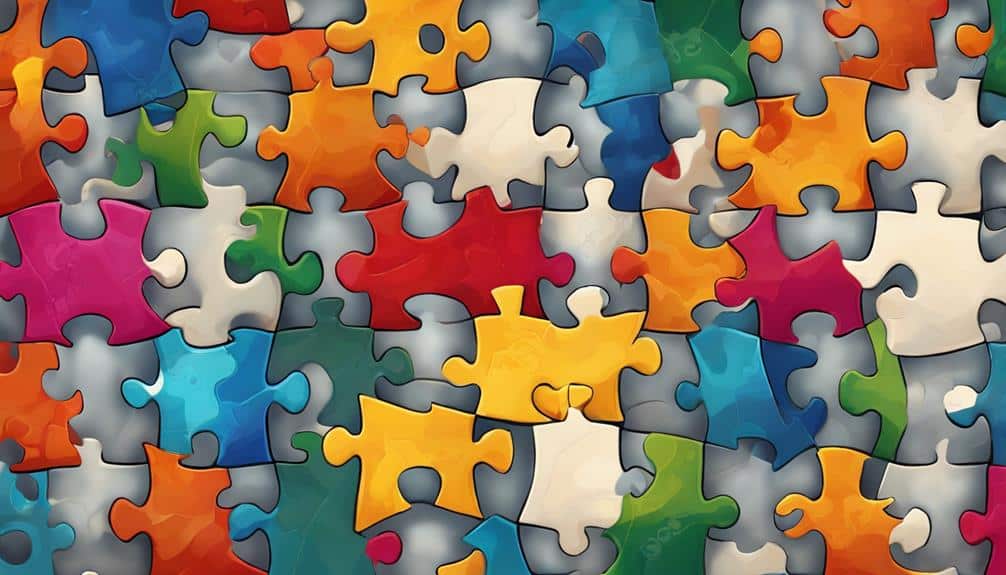The Five Neurodivergent Love Languages
Have you ever considered the intricate ways neurodivergent individuals perceive and convey love?
What if I told you that there are Five Neurodivergent Love Languages that shed light on these nuances?
Understanding these unique modes of affection could revolutionize the way we connect with individuals on the spectrum.
By recognizing and honoring these distinct love languages, we open doors to deeper, more fulfilling relationships that transcend traditional expressions of love.
Key Takeaways
- Info dumping and penguin pebbling are unique ways neurodivergent individuals express love.
- Support swapping and deep pressure enhance connections and well-being.
- Valuing shared activities and tailored communication builds trust and understanding.
- Small gestures and tactile comfort foster deep emotional bonds in neurodivergent relationships.
Understanding Neurodivergent Love Languages

Understanding neurodivergent love languages involves recognizing and appreciating the diverse ways individuals express and receive affection within non-neurotypical relationships. In neurodivergent relationships, expressing love can take on various forms beyond traditional methods. The five neurodivergent love languages—infodumping, body doubling, penguin pebbling, seeking support, and deep pressure—are important in understanding and nurturing these relationships.
Expressing love through infodumping entails passionately sharing detailed knowledge and interests to establish connections with others. This form of communication allows neurodivergent individuals to bond over shared passions and interests, fostering a deeper emotional connection. Additionally, body doubling, where partners cohabit in the same space for comfort and support without continuous interaction, provides a sense of security and solidarity in neurodivergent relationships.
Penguin pebbling involves the exchange of small tokens of appreciation and affection, symbolizing care and thoughtfulness within the relationship. Seeking support is another essential love language among neurodivergent individuals, involving offering help, reminders, and assistance to create a supportive and understanding environment. Lastly, deep pressure, such as tight hugs or weighted blankets, can convey love and comfort in a tactile manner that's deeply appreciated by neurodivergent partners.
Exploring Info Dumping as a Love Language

Info dumping as a love language is a unique form of communication often found among neurodivergent individuals.
This practice involves sharing intricate details, facts, and emotions passionately to establish deep connections with others.
Research suggests that info dumping can serve as a meaningful way for neurodivergent individuals to express affection and forge bonds through their special interests.
Neurodivergent Communication Styles
When delving into neurodivergent communication styles, exploring info dumping as a love language reveals a unique form of passionate and detailed sharing. Neurodivergent individuals express love and form meaningful connections through sharing extensive knowledge, facts, and feelings.
This communication style allows for the deep expression of emotions and fosters trust within relationships. Info dumping serves as a way for neurodivergent individuals to showcase their affection and build connections with others.
Understanding and valuing info dumping can greatly enhance communication and strengthen relationships with neurodivergent individuals. By recognizing this communication style as a love language, we can create more inclusive and supportive environments for neurodivergent individuals to express themselves authentically and form deep connections based on shared interests and passions.
Emotional Connection Through Sharing
Exploring the emotional depth of neurodivergent individuals through the lens of info dumping as a love language reveals a profound connection rooted in passionate sharing and intricate communication.
- Info dumping: Neurodivergent individuals express love through sharing extensive information, facts, and feelings.
- Deep connections: This form of communication allows for profound emotional connections to be established and expressed.
- Unique expression: Info dumping is a distinctive way for neurodivergent individuals to demonstrate love and affection by sharing their knowledge and experiences.
- Enhanced relationships: Understanding and valuing info dumping as a love language can lead to stronger relationships and improved communication with neurodivergent individuals.
The Significance of Penguin Pebbling

Penguin pebbling, as a neurodivergent love language, holds significance in fostering social bonding and strengthening relationships. This ritual involves the exchange of small tokens or gifts, serving as a form of communication to convey appreciation and care.
Penguin Pebbling Ritual
Drawing from the intricate behavior of penguins in their natural habitat, the ritual of penguin pebbling showcases a unique form of neurodivergent love language centered around thoughtful expressions of affection. This neurodivergent love language involves gifting small tokens or items, symbolizing care and consideration for the recipient.
Here's how the penguin pebbling ritual signifies meaningful connections and expressing love:
- Thoughtfulness: The act of collecting and sharing items related to a loved one's interests demonstrates deep thought and consideration.
- Significance: Like penguins gathering pebbles to build nests, penguin pebbling symbolizes dedication and love.
- Unique Interests: Acknowledging and appreciating the recipient's unique interests is key to expressing love through this ritual.
- Neurodivergent Value: Neurodivergent individuals find significance in small, thoughtful gestures like penguin pebbling for fostering connections.
Social Bonding Behavior
In understanding the social bonding behavior inherent in the penguin pebbling ritual, it becomes evident that this unique form of neurodivergent love language encapsulates a profound connection through thoughtful gestures and shared interests.
Neurodivergent individuals express their affection by exchanging small tokens or gifts, similar to how penguins gather pebbles to show love. This act of penguin pebbling serves as a heartfelt way for neurodivergent individuals to convey care and foster meaningful relationships.
Communication Through Pebbles
Through the exchange of small tokens related to dedicated interests, neurodivergent individuals engage in a unique form of communication known as penguin pebbling, emphasizing thoughtful expressions of care and affection.
- Meaningful Relationships: Penguin pebbling nurtures deep connections through the exchange of items that hold personal significance.
- Express Appreciation: Neurodivergent individuals use pebbling to convey love and gratitude in a way that resonates with their unique communication styles.
- Unique Way of Communication: This practice highlights the diverse ways in which love languages manifest within neurodivergent relationships.
- Strengthening Connections: By participating in penguin pebbling, individuals reinforce bonds and create a shared language of affection that strengthens their connection.
Enhancing Connections Through Parallel Play

Engaging in parallel play activities fosters meaningful connections and understanding among neurodivergent individuals. This neurodivergent love language involves sharing time and space while engaging in activities independently but alongside each other. It provides a sense of companionship and closeness without the need for constant verbal communication, allowing individuals to feel understood and connected through shared presence.
Parallel play enhances connections by creating a comfortable and low-pressure environment for bonding. Neurodivergent individuals often struggle with traditional forms of social interaction, making parallel play an ideal way to foster relationships. Through shared activities, individuals can experience a sense of togetherness and belonging, even without direct engagement. This shared experience helps in building trust, empathy, and understanding between neurodivergent partners.
In relationships where parallel play is a prominent love language, the emphasis on shared presence and mutual activities becomes a cornerstone for connection. By participating in parallel play, neurodivergent individuals can strengthen their bond and feel supported, accepted, and valued.
Deep Pressure: A Neurodivergent Expression of Love

Utilizing firm physical touches such as hugs or hand-squeezes, deep pressure serves as a neurodivergent expression of love with grounding effects for individuals. Neurodivergent individuals, like myself, may find deep pressure gestures particularly comforting. Here are some key points to take into account regarding deep pressure:
- Calming Effect: Deep pressure can help calm and relax neurodivergent individuals, providing a sense of security and grounding in overwhelming situations.
- Connection to Stimming: Deep pressure is often related to stimming behaviors and can be a soothing form of self-regulation for many neurodivergent individuals.
- Use of Tools: Weighted blankets or other items that provide deep pressure can offer comfort and a feeling of containment, aiding in managing sensory sensitivities.
- Individual Preferences: It's essential to ask how someone likes to receive deep pressure gestures, as preferences can vary widely among neurodivergent individuals.
Understanding and respecting the significance of deep pressure as a neurodivergent expression of love can foster meaningful connections and support relationships.
Support Swapping for Meaningful Relationships

Support swapping, a neurodivergent love language, facilitates mutual assistance and nurturing interactions within relationships by exchanging help and reminders. Neurodivergent individuals find value in this love language as it creates a deep sense of understanding and connection, fostering meaningful relationships.
The essence of support swapping lies in the reciprocity and collaborative effort to meet each other's needs and promote overall well-being. By engaging in support swapping, neurodivergent individuals strengthen the bonds with their partners or loved ones, enhancing the feeling of belonging and support within their relationships.
This practice goes beyond mere assistance with tasks; it involves providing comfort, care, and emotional support in ways that resonate profoundly with neurodivergent individuals. Ultimately, support swapping serves as a cornerstone for building strong, empathetic relationships that cater to the unique needs and preferences of neurodivergent individuals, creating a nurturing environment where both parties feel understood and valued.
Frequently Asked Questions
What Are the Love Languages for Neurodivergent?
Understanding neurodivergent communication involves recognizing unique expressions of love such as info dumping, penguin pebbling, parallel play, deep pressure, and support swapping. These non-traditional gestures foster emotional connections, empathy, and validation, meeting diverse needs.
What Are the 5 Love Languages of Adhd?
In ADHD relationships, understanding needs is key. Neurodivergent communication differs from typical styles. Love expression includes deep pressure, parallel play, info dumping, penguin pebbling, and support swapping. Connecting through these diverse methods is crucial for showing appreciation.
How Do Neurodivergent People Love?
Expressing my love involves unique communication preferences, emotional expressions, sensory needs, boundaries setting, affection levels, and support languages. I connect through sharing knowledge, giving thoughtful gifts, parallel play, deep pressure, and swapping support.
What Are the 5 Different Love Languages?
Understanding boundaries, nonverbal communication, sensory preferences, emotional regulation, shared interests, and showing appreciation are crucial aspects of interpreting love languages. Recognizing these elements enhances connection and fosters meaningful relationships.
Conclusion
To summarize, understanding and embracing the Five Neurodivergent Love Languages can truly transform relationships with neurodivergent individuals.
By recognizing and respecting these unique forms of expressing affection, we can forge deeper connections and create a more inclusive and supportive environment.
It's ironic how something as simple as recognizing and honoring diverse ways of communication can lead to profound and meaningful relationships.







